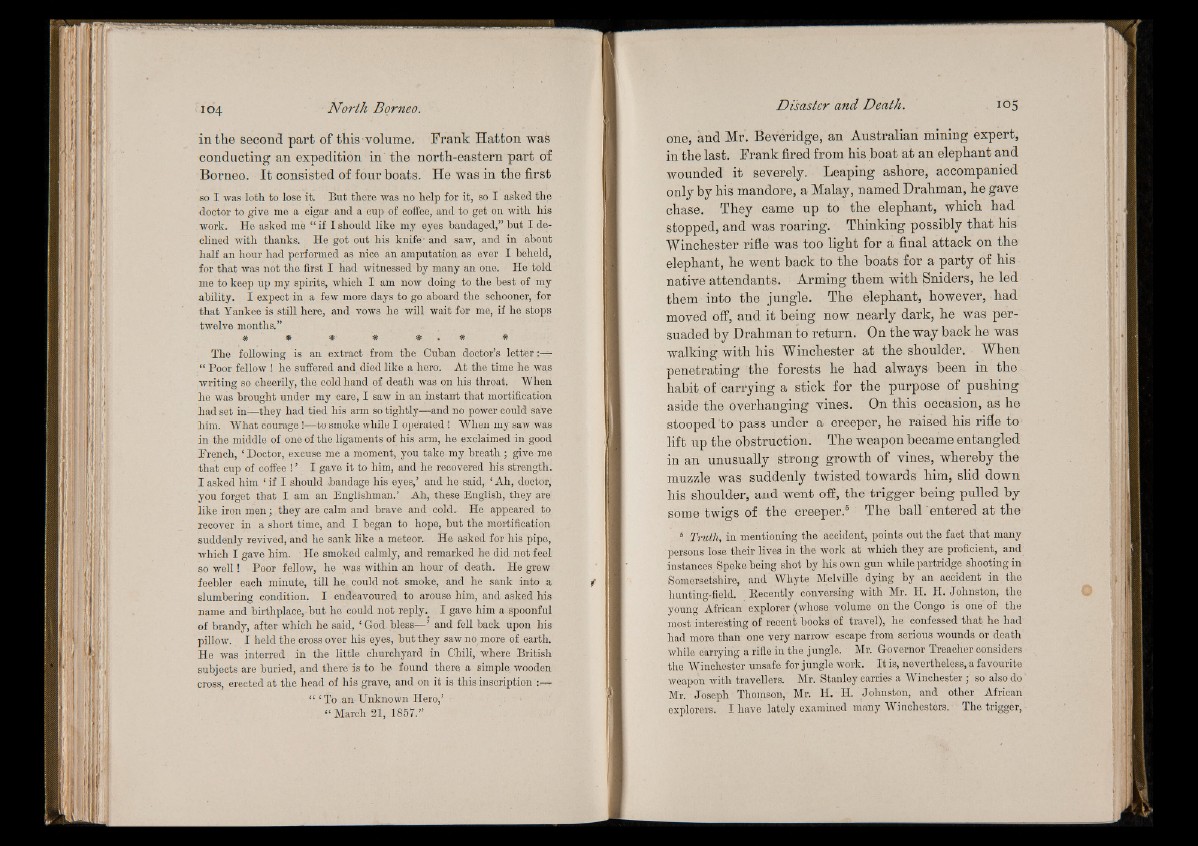
in the second part of this volume. Frank Hatton was
conducting an expedition in the north-eastern part of
Borneo. I t consisted of four boats. He was in the first
so I was loth to lose it. But there was no help for it, so I asked the
doctor to give me a cigar and a cup of coffee, and to get on with his
work. He asked me “ if I should like my eyes bandaged,” hut I declined
with thanks. He got out his knife1 and saw, and in about
half an hour had performed as nice an amputation as ever I beheld,
for that was not the first I had witnessed by many an one. He told
me to keep up my spirits, which I am now doing to the best of my
ability. I expect in a few more days to go aboard the schooner, for
that Yankee is still here, and vows he will wait for me, if he stops
twelve months.”
# * # # # . # *
The following is an extract from the Cuban doctor’s letter
“ Poor fellow ! he suffered and died like a hero. At the time he was
writing so cheerily, the, cold hand of death was on his throat. When
he was brought under my care, I saw in an instant that mortification
had set in—they had tied his arm so tightly—and no power could save
him. What courage !—to smoke while I operated ! When my saw was
in the middle of one of the ligaments of his arm, he exclaimed in good
French, ‘Doctor, excuse me a moment, you take my breath; give me
that cup of coffee !’ I gave it to him, and he recovered his strength.
I asked him 1 if I should .bandage his eyes,’ and he said, 1 Ah, doctor,
you forget that I am an Englishman.’ Ah, these English, they are
like iron men; they are calm and brave and cold. He appeared to
recover in a short time, and I began to hope, hut the mortification
suddenly revived, and he sank like a meteor. He asked for his pipe,
which I gave him. He smoked calmly, and remarked he did not feel
so well! Poor fellow, he was within an hour of death. He grew
feebler each minute, till he could not smoke, and he sank into a f
slumbering condition. I endeavoured to arouse him, and asked his
name and birthplace, but he could not reply% I gave him a spoonful
of brandy, after which he said, ‘ God bless—’ and fell hack upon his
pillow. I held the cross over his eyes, but they saw no more of earth.
He was interred in the little churchyard in Chili, where British
subjects are buried, and there is to be found there a simple wooden
cross, erected at the head of his grave, and on it is this inscription :—
“ ‘To an Unknown Hero,’
“ March 21, 1857.”
one, and Mr. Beveridge, an Australian mining expert,
in the last. Frank fired from his boat at an elephant and
wounded it severely. Leaping ashore, accompanied
only by his mandore, a Malay, named Drahman, he gave
chase. They came up to the elephant, which had
Stopped, and was roaring. Thinking possibly that his
Winchester rifle was too light for a final attack on the
elephant, he went back to the boats for a party of his
native attendants. Arming them with Sniders, he led
them into the jungle. The elephant, however, had
moved off, and it being now nearly dark, he was persuaded
by Drahman to return. On the way back he was
walking with his Winchester at the shoulder. When
penetrating the forests he had always been in the
habit of carrying a stick for the purpose of pushing
aside the overhanging vines. On this occasion, as he
stooped‘to pass under a creeper, he raised his rifle to
lift up the obstruction. The weapon became entangled
in an unusually strong growth of vines, whereby the
muzzle was suddenly twisted towards him, slid down
his shoulder, and went off, the trigger being pulled by
some twigs of the creeper.5 The ball entered at the
6 Truth, in mentioning the accident, points out the fact that many
persons lose their lives in the work at which they are proficient, and
instances Speke being shot by his own gun while partridge shooting in
Somersetshire, and Whyte Melville dying by an accident in the
hunting-field. Becently conversing with Mr. H. H. Johnston, the
youn» African explorer (whose volume on the Congo is one of the
most interesting of recent books of travel), he confessed that, he had
had more than one very narrow escape from serious wounds or death
while carrying a rifle in the jungle. Mr. Governor Treacher considers
the Winchester unsafe for jungle work. It is, nevertheless, a favourite
weapon with travellers. Mr. Stanley carries a Winchester; so also do
Mr. Joseph Thomson, Mr. H. H. Johnston, and other African
explorers. I have lately examined many Winchesters. The trigger,